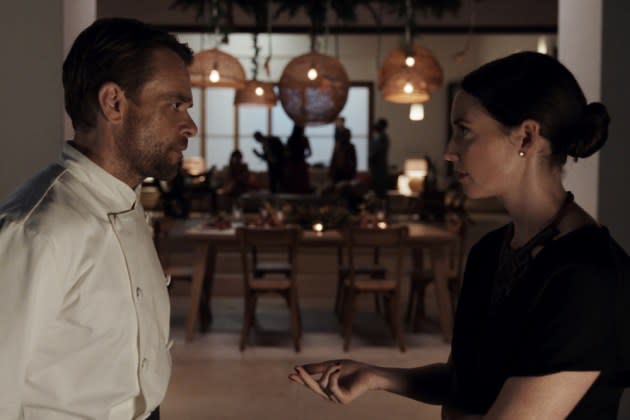‘What You Wish For’ Review: Nick Stahl Serves a Devious Dish in This Taut but Half-Baked Thriller

It sounds like a dream for a chef: Every few weeks, fly first class to a tropical location to cook haute cuisine for a handful of VIPs, getting paid hundreds of thousands of dollars for your trouble. But that fantasy’s nightmarish reality hits hard for one talented chef after he assumes his culinary school comrade’s life in “What You Wish For.” Filmmaker Nicholas Tomnay’s sophomore feature percolates with atmospheric dread and austerity, but only superficially explores the twisted amorality of the 1% and those who service their whims. While not always successful in cooking up tantalizing commentary on human behavior, it offers a decent helping of Hitchcockian intrigue.
Ryan (Nick Stahl) is looking to get away. He’s incurred a massive amount of gambling debt and his bookie’s threatening text messages are escalating. He hasn’t blocked the incoming number because of his naiveté and a penchant for getting in over his head. His plan is to hide out in another country — somewhere in Latin America (the film doesn’t specify) — visiting his former culinary school roommate Jack (Brian Groh). The two haven’t seen each other in a decade and their career paths have diverged: Ryan works in a chain hotel kitchen in Dallas, while Jack is a private chef for a Slovenian catering company that travels all over the world.
More from Variety
Following his arrival at the tropical mansion where Jack has been hired to cook an exclusive meal for some rich clients, Ryan notices his pal is haunted and jaded by his success. Jack’s high-pressure career is taking an emotional toll that’s boring a hole in his soul no amount of money can fill. So when Jack kills himself, envious opportunist Ryan sees a chance to break free from the shackles of his impoverished mundanity and commandeer Jack’s lucky life. However, once Jack’s bosses Imogen (Tamsin Topolski) and Maurice (Juan Carlos Messier) show up, Ryan gets a taste of the deal he’s struck.
There are cheeky referrals to the Big Dinner’s main ingredient — one that would be unsavory to spoil — as “produce,” generating heightened tension and decent character development. The screws tighten further when local investigator Detective Ruiz (Randy Vasquez), who’s suspicious of the company, is invited to join the party. Stahl’s precise, perfectly subdued performance hits the right notes when calibrating the film’s tonal range, especially when delving into the character’s depraved, darker facets. He turns in compelling work, getting us to root for this anti-hero despite Ryan’s compromised ethics. His expressive physicality, compartmentalizing his dastardly actions, neatly channels the push-pull of the theme’s emotional undertow. In addition, Topolski is a revelation. She’s magnetic, gracefully in sync with her scenes’ macabre melodies and rhythms.
Alas, the plot hiccups midway through the brisk runtime, ultimately getting indigestion during the hokey finale where our antihero predictably values his former humdrum life. For every creative scenario that organically has characters — such as Detective Ruiz and Jack’s one-night stand Alice (Penelope Mitchell) — unable to leave the home after surprising everyone on event night, there’s a nonsensical contrivance holding it back. For Alice, it’s questionable that she doesn’t immediately flee after spotting Jack’s watch, which symbolizes Ryan’s greed, envy and failure, on his wrist. For Ruiz, dubious excuses don’t quite explain his inability to fetch his forgotten cell phone charging in the main kitchen. And considering how much the company insists it has hidden these insidious activities under the guise of altruism, their fail-safe tactics for dealing with authorities seem ridiculous.
While the narrative loses its grasp, the aesthetics hold a tight grip. From the God’s-eye perspective used in the opening credits (a visual indicator of the film’s continual judgement of Ryan in these sinister shenanigans) to the static camera shots imparting a sense of disarming unease, Tomnay’s acute design sensibilities add an entrancing pull. His edits slice through the scenery like a butcher’s knife. Mateo Guzmán Sanchez’s cinematography illuminates characters’ depths and dimensions. With its plucky staccato strings, Jeff Russo and Tracie Turnbull’s score hints at the puzzle our protagonist must piece together to survive. Ryan’s dual-sided internal struggles are reflected in Diana Trujillo’s production design, contrasting the sterility of the concrete-and-tile basement and the home’s warm, soft living spaces.
Still, compared to the devilishly nasty satirical bite of “The Menu,” Tomnay serves up a blandly seasoned dish lacking in wit and incisiveness. The film is done a disservice by equating the haves and the have-nots, positing that moral bankruptcy knows no economic background. Though Ryan ultimately feels the burden of his brash decision, the obvious Aesop’s Fables-inspired lessons make what could’ve been an extraordinary meal into something far less memorable.
Best of Variety
Sign up for Variety’s Newsletter. For the latest news, follow us on Facebook, Twitter, and Instagram.

